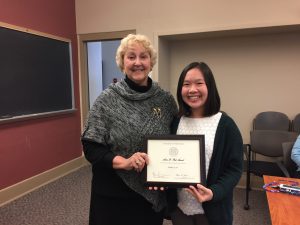Every year, the Institute of Child Development (ICD) awards one undergraduate child psychology student with the Anne D. Pick Award for an Outstanding Child Psychology Major. The recipient demonstrates excellence in research and academics in the area of child development.
This year’s recipient is Natalie Low, who studies emotion regulation (ER) at ICD. Low currently conducts research in the Cognitive Development and Neuroimaging (CDN) Lab with ICD Professor Kathleen Thomas, Ph.D., on how children learn different strategies from the environment to help them regulate their emotions.
Along with an inscribed plaque, Low will receive a scholarship of $500 and up to $250 in travel/ research funds. Below, Low discusses how she developed an interest in child psychology and her post-graduation plans.
What made you want to study child psychology?
I came across the child psychology major by chance. While applying to transfer to the University of Minnesota, I was unsure of what I wanted to major in and as I was filling out my application, I chanced upon the major. I knew that I wanted to continue pursuing something related to the field of psychology or the social sciences and that I wanted to work with children. Looking back, this decision has been one filled with great reward and tremendous challenge, but it is something that I don’t regret.
What kind of research are you involved in?
As an undergraduate research assistant in the CDN Lab, I investigated the role of early experience in brain development. As part of an independent study, I have developed a coding scheme, with the assistance of Dr. Thomas, to examine attentional strategies used by preschool children to regulate their emotions. I also have worked with ICD Associate Professor Melissa Koenig, Ph.D., in the Early Language and Experience Lab (ELEL), where I examined how preschool children reason about the intentions and actions of people. Currently, I am assisting Dr. Thomas in a separate study examining social and emotional development in children who have had a hemipherectomy (half of their brain removed).
What do you find most interesting about child development?
You can never have two children who are exactly alike. Child development is continuously affected by biological factors, environmental factors, and even an amalgamation and interaction of both. I find it interesting how even under similar conditions, two children will be different from one another, especially in the research area I am interested in, emotional development, whereby children may use similar strategies for regulation.
What are your plans after graduation?
My coursework, clinical experience and research experiences have inspired me to attend graduate school in developmental psychology. I have received numerous opportunities to study cognitive development in children, but still continue to find it intriguing, especially in its relation to emotional development. Ultimately, I hope to attend graduate school to attain the skills necessary for a career as a qualified and inquisitive developmental researcher and to continue to contribute and create greater awareness and understanding of child development.




